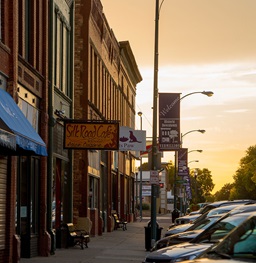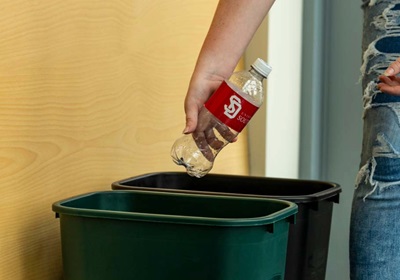
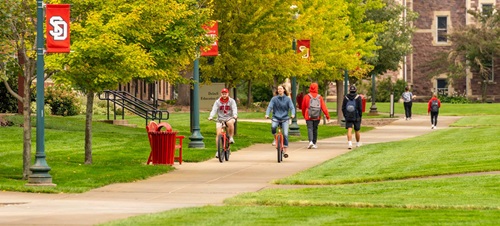
SUSTAINABILITY INITIATIVES
Sustainability is an ever-growing collaboration on campus to build healthy, fair, and resilient systems that help everyone thrive. By working together, USD aims to grow and become a more sustainable university.
Coyotes are dedicated to sustainability
Faculty, staff, and students can support the environment by minimizing their impact on campus and within the community. You have the opportunity to be involved and contribute to many sustainability initiatives on campus.
Recycling

Students run our campus recycling program for paper, cardboard, cartons, cans, tubs, jugs, bottles, and jars. Watch what happens to our recyclable materials here. Learn more or submit a recycling request on Coyote One Stop. Check Coyote Careers for recycling job openings - it's a great opportunity for students to earn money, gain work experience, and reduce waste.
Sporting events are an important way for Coyotes to rally and show school pride. Most sporting events are held at the Dakota Dome and the Sanford Coyote Sports Center. Make sure to recycle on game day.
- Green recycling containers – the single stream recycling containers seen across campus – are found at strategic locations in the Dome and Coyote Sports Center.
- Also look also for bottle-shaped bins to dispose of plastic bottles.
- Put trash in trash bins.
- Outside tailgating: Clearly marked recycling bins paired with trash bins will be available around the perimeter of tailgating areas.
University housing actively participates in our sustainability efforts. USD resident halls are one of our priorities for recycling on campus due to the volume of recyclables generated from the residence halls. Each room comes with separate trash and recycling bins. Please take your trash out to the dumpster. Empty your recycling bin into the large green bin in the lobby of your residence hall. Please do not put recycling in bags.
Below is a guide on what we recycle and what we don’t.
Recycling: (Everything Empty – No Food, No Liquid)
- Paper
- Plastic bottles, tubs and jugs
- Cardboard and cartons
- Metal cans
- Glass jars and bottles
Trash:
- Paper towels, tissues
- Styrofoam
- Straws or lids
- Plastic cups
- Clamshell containers
- Pots and pans, silverware
- Mirrors, ceramics, dishes, light bulbs
For more information visit: https://www.millenniumrecycling.com/singlestream/ to see where the collected recyclables go.
What is the Green Initiative Fund?
The Green Initiative Fund addresses challenges facing our planet by granting students financial resources to make long-lasting environmental improvements on campus. The fund gives students the opportunity to learn project planning and implementation skills while generating ideas, pride, and momentum to inspire further action in our community.
The President’s Joint Committee on Sustainability reviews all project proposals and makes recommendations on how to award the funds. SGA senators serving on the Committee bring the recommendations to the full SGA Senate, and then Senate votes on the final decision. Multiple projects may receive funding each application cycle. Funds are to be used within a single fiscal year: July 1st through the last day of the spring semester final exam period.
How did the Green Initiative Fund start?
The Student Government Association (SGA) started the Green Initiative Fund (GIF) in April 2016, and the first funds were spent in fiscal year 2017 to start the campus bike share program.
How much is the Green Initiative Fund?
Each spring semester, SGA allocates funds to the GIF through the annual budget process, which requires the full SGA Senate to pass a bill approving the SGA budget for the fiscal year beginning in July. The Senate typically allocates $5,000 to the GIF, but the amount can vary. These funds come from the General Activity Fee (GAF) paid by students.
Who can apply?
- USD enrolled students. Full-time, part-time, undergraduate and graduate students are eligible. Working in teams is encouraged, though one student should identify as the main contact for the GIF.
- USD registered student organizations. (To register a new student organization, please visit USD Campus Groups.)
What types of projects can be funded?
- We are looking for projects that:
- Measurably reduce USD’s carbon footprint and/or waste into the future.
- Involve a visible component.
- We encourage partnering with an established campus office or department.
- All else being equal, we prefer projects that benefit people and areas of campus that have benefited least from environmental improvements in the past.
- Ineligible Projects:
- Speakers
- Films
- Awards, Gifts, Scholarships
Examples of past projects include:
- Campus bike share program
- Recycling & landfill bins for residence hall rooms
- Zero-waste laundry detergent sheets
Examples of future projects include:
- Educational exhibits or displays
- Zero Waste Atlas Campus Certification improvements
- Mobile water bottle refilling stations for outdoor events
- Reusable to-go container infrastructure improvements
- Clothes hangers for every residence hall room
- Self-serve bicycle repair and service kiosk
- Reusable utensil sets for incoming students
- Cargo bikes to collect recyclables at tailgates
- Bicycle parking shelters
- Electric vehicle charging station
- Science lab sustainability
- Solar phone charging stations
- Other innovative ideas are welcome!
Propose a Project
Students have the opportunity to apply for the Green Initiative Fund in both the Fall and the Spring semester. Start by submitting a pre-proposal. Selected pre-proposals will be given feedback and asked to submit a full project proposal for consideration. Please see the timeline for deadlines.
Move-Out Donation Information
When: April 29 – May 9, 2025
Where:
- 24-hour collections in Lobby areas: Richardson/Olson Coyote Village Burgess/Norton
- 9AM -9PM collections in – Back Garage (#23) -will be marked from the inside and outside) at McFadden
- All Household essentials
- Examples: vacuum, lamps, shelves, etc.
- All kitchen essentials
- Examples: dishes, pots and pans, etc.
- Cleaning supplies
- Personal hygiene items
- Furniture
- Examples: tables, racks, floor lamps, futons, small couches, chairs, recliners, etc.
- Electronics
- Examples: computers, heaters, monitors, TVs, etc.
- Small Appliances
- Examples: coffee pots, microwaves, mini fridges, toaster ovens, etc.
- Non-Perishable Food Items
- Examples: non refrigerated foods, canned goods, boxed goods, bottled water, etc.
- Place your gently used items in the designated Donation Boxes
- All household items, clothing items: Place in the collection boxes. No need to sort.
- Small appliances (microwaves, air fryers, coffee machines, water filters, mini fridges, etc.): Place on pallets next to the collection boxes.
- Computers, monitors, cords, chargers, headphones, etc.: Place on pallets next to collection boxes.
- All donatable furniture goes outside near the dumpster.
- Broken or unusable furniture, please place inside the dumpster.
- All non-perishable food items: Place in designated totes
- Please do not leave any food items in the kitchenette areas of the Residence Halls
- Area rugs
- Carpets or any flooring
- Mattress toppers
- Bed pillows
- Bed rolls or egg crate mattress enhancers
- Mattresses of any kind
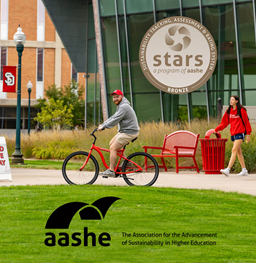
A Leader in Sustainability
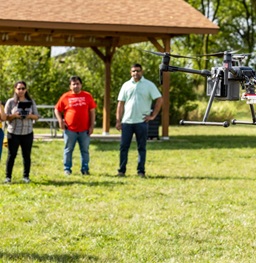
Green Initiative Fund
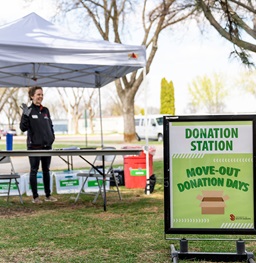
Move-Out Donations
USD’s annual move-out donation program helps prevent usable items from going to the landfill when students move out at the end of the year. This event, scheduled at the end of spring semester, provides students convenient donation options that show the benefits of reuse, waste reduction and local donation.
For more information, contact the Office of Service Learning at [email protected] or check USD Involved.
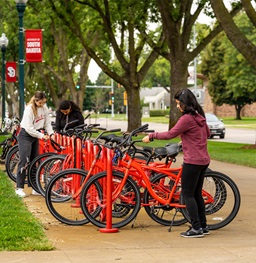
Bike Share
Biking is a great way to get around! The University offers a fleet of bicycles that students may check out for free. The bikes are located at the University Police Department, Davidson Building. If you have your own bicycle, you may register it at the University Police Department for peace of mind.
- You will need your USD student ID
- Check out is at the UPD, Davidson Building, 24 hours a day
- Bikes can be checked out for up to 72 hours
If you have questions, contact the Office of Service Learning at [email protected].

Campus Sustainability Assessments

Dining/Buildings & Grounds
Coyote Dining strives for sustainability through responsible sourcing, plant-based options, waste reduction, and more. Learn more about dining commitments here.
Our Facilities Management staff maintain water bottle refill stations in every building, use green cleaning practices, and continually work to improve energy efficiency. We are a certified Tree Campus, and our landscaping includes attractive and drought-tolerant native prairie plants.
